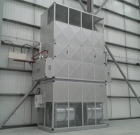AmbiRad ventures out with outdoor specialist

AmbiRad has combined a Nordair Niche air rotation heater with radiant tube heaters to deliver space heating and frost protection for the new 60 000 m2 distribution centre of Regatta Group, which specialises in outdoor clothing and footwear. The centre is at Ellesmere Port and was opened earlier this year by adventurer Bear Grylls. Called Pioneer Port it has over 8 km of racking and more than £36 million-worth of stock. The manually picked racking units are 15.6 m high.
The project required frost protection to protect items of clothing and heating to keep employees warm. AmbiRad worked with Thermatic of Salford to install the system.
The air rotation heater is automatically controlled to protect against frost. It draws in air at floor level and discharges it at high level across the building to keep warmed air circulating. The system also captures heat from lighting and other sources, reducing energy consumption. It ensures a steady regulated temperature of between 5 and 15°C to provide background warmth for employees
The radiant heating supports the warm-air system and heats up rapidly to warm people in the building directly.







